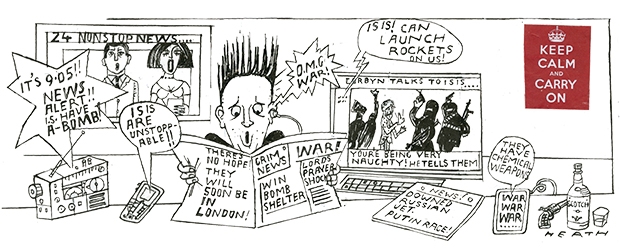Home
David Cameron, the Prime Minister, announced, as part of the Strategic Defence and Security Review, plans for two 5,000-strong ‘strike brigades’ that could respond to terrorist attacks on Britain. Spending on defence would go up by £12 billion, keeping it above 2 per cent of GDP. The estimate for replacing Britain’s four Trident ballistic missile submarines rose from £25 billion to £31 billion. The Nimrod maritime patrol aircraft, scrapped in 2010, would be replaced with nine Boeing P-8s. Aircraft for the Navy’s two new aircraft carriers would be ready by 2023. The government made preparations for a vote in the Commons in favour of Britain bombing Islamic State targets in Syria.
George Osborne, the Chancellor of the Exchequer, tried to take people’s minds off departmental spending cuts in his Autumn Statement by announcing that he would not after all introduce the changes to tax credits thrown out by the House of Lords. He also announced a £6.9 billion scheme to help people buy houses, with £2.3 billion of it going to developers to get them to build 200,000 starter homes. Northern railways saw some investment. In England alone, the National Health Service front-line budget of £101 billion would rise by £3.8 billion next year. Mark Carney, the governor of the Bank of England, told the Commons Treasury Committee that British interest rates were likely to remain low ‘for some time’. More than 900 trains in East Anglia were cancelled because of damage from burning leaves to the wheels of rolling stock too light to properly mash them up.
British Airways and easyJet cancelled all flights to Sharm el-Sheikh in Egypt until next year. A Libyan man was arrested on suspicion of conspiracy to murder PC Yvonne Fletcher outside the Libyan embassy in London in 1984. Natalie McGarry relinquished the SNP whip while the finances of Women for Independence, which she helped found, were investigated. Alton Towers said that human error caused the rollercoaster crash in June that seriously injured five people. The Digital Cinema Media agency refused to show an advertisement by the Church of England, which had obtained a U certificate, because it featured the words of the Lord’s Prayer, which were deemed offensive to some.
Abroad
Turkey shot down a Russian warplane near the Syrian border. One of the pilots and a Russian soldier searching for the pilots were killed on the ground. President Recep Tayyip Erdogan of Turkey said: ‘Everyone should respect the right of Turkey to defend its borders.’ President Vladimir Putin of Russia called it a ‘stab in the back’ by ‘accomplices of terrorists’. President Barack Obama of the United States said: ‘I do think this points to an ongoing problem with Russian operations.’ The remains of Abdelhamid Abaaoud, the Belgian leader of the attacks that killed 130 in Paris, were identified in a flat in Saint-Denis, with those of a woman, Hasna Ait Boulahcen, and another terrorist who had detonated explosives. Belgium closed schools and told people to stay at home for four days lest terrorists attack. Belgians tweeted pictures of cats in solidarity. Gunmen took hostage 138 people at the Radisson Blu hotel in Bamako, Mali, and 19 were killed by the time special forces had stormed the hotel. The attack was said to have been carried out jointly by al-Mourabitoun, the militia led by the one-eyed Mokhtar Belmokhtar, and al-Qaeda in the Islamic Maghreb.
Scores of migrants found the border from Greece to Macedonia closed. Angela Merkel, the Chancellor of Germany, was publicly embarrassed by Horst Seehofer, the leader of the Bavarian sister party to her Christian Democratic Union, who criticised her failure to put a maximum number on the migrants that Germany would accept. A fire in a camp in Algeria for about 650 migrants from Niger and Mali killed at least 18. Abid Naseer, 29, a Pakistani man extradited from Britain to the United States in 2013, was sentenced to 40 years in jail for plotting attacks on Manchester, New York and Copenhagen. A bus carrying presidential guards in Tunis was hit by a bomb, which killed 12 people.
Crimea’s electrical power, which comes from Ukraine, was cut off. Somali pirates attacked a Thai trawler and captured the 15 crew of an Iranian vessel; about 56 other foreigners are being held by pirates in Somalia. Mauricio Macri, of the conservative Cambiemos party, beat the left-wing Peronist candidate to be elected President of Argentina. Five people went on trial in the Vatican for publishing confidential documents. CSH






Comments